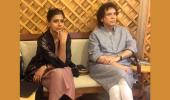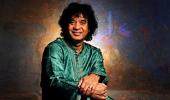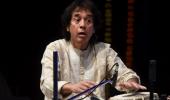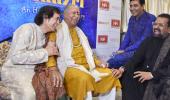The eulogies will pour for Ustad Zakir Hussain.
There will be those who recount his genius, his enterprise, his achievements, his grace, and his charm.
I have no selfies or autographs to remember him by, but I will never forget his most generous and gracious gift to me -- one day in heaven, among the celestial ensemble of Indian music.

In January 2003, winter stopped by this city by the sea just long enough to give the humidity a few days off.
I was working at the India Abroad newspaper, which Rediff's desk compiled from Mumbai, and I occasionally reported on music.
We had closed the magazine issue in the wee hours of Friday night. Late on Saturday morning, my day off, I was enjoying a leisurely shower when my phone trilled.
Lathered and dripping, with soap gurgling in my ears, I answered just before the caller growled a message and hung up.
"Shakti has a press conference at [unintelligible]. John McLaughlin and Zakir Hussain are there. Go."
My editor, laconic as ever, didn't wait to check if I had heard him through. In the early years of Internet journalism in India, journalists at online news portals were the last to know of press conferences, and we were rarely invited.
Since I worked with a print publication, technically, I had a press card, and I used it to gatecrash the event.
I was late, though. The presser had wrapped up and media-persons were swarming like ants around the sumptuous buffet.
Chatting with some of them, I gathered that Shakti, the fusion supergroup formed in the 1970s by the English jazz guitarist John McLaughlin with Ustad Zakir Hussain on tabla, had regrouped for a tour.
Dubbed Remember Shakti, the band had a new line-up, replacing members of the original quintet -- the stalwart double-violinist L Shankar and ghatam virtuoso T H (Vikku) Vinayakram, respectively -- with the prodigious U Shrinivas on the mandolin and Vinayakram's son, the brilliant percussionist Selvaganesh, on the kanjira.
Remember Shakti would headline a day-long musical extravaganza at the city's Shanmukhananda auditorium on the coming February 3.
Called 'Homage to Abbaji', it was a tribute to Hussain's father, the tabla legend Ustad Alla Rakha, on his third death anniversary.
That was 2003. The term FOMO hadn't yet been coined, but it closely described what I felt then. There was no way I was going to walk out of there without a story.

Feverishly, I scanned the room. At arm's length from the winding queue of ravenous scribes, standing lofty and godlike, was the radiant apparition of John McLaughlin.
His hair was silver and his eyes were blue. He didn't look 60. He was wearing a deep-indigo silk kurta with a flaming daub of vermilion on his forehead.
Munching on a papad, he talked animatedly to the percussionist Toufiq Qureshi, Ustad Zakir Hussain's younger brother.
I smoothed the creases on my shirt, dabbed at the sweat on my brow, and sidled up to them.
McLaughlin and Qureshi were discussing the Australian Open, and Qureshi was chuckling as McLaughlin made a joke about John McEnroe.
I introduced myself to McLaughlin, nodded to Qureshi, and asked the guitarist if he would answer my questions.
He smiled at me with perfect teeth, and we began a conversation. Noticing me scribbling notes, a television crew crept up and began to film us.
I turned around in annoyance. At that moment, Ustad Zakir Hussain strode in, diminutive but fierce and commanding like Napoleon on a gusty day.
His mane flared behind his head, and his brow was knitted by a frown that could melt a polar ice-cap.
"The press conference is over. Please have the decency to let him have his lunch!" he rebuked the TV crew and shooed them off.
The maestro glowered at me and opened his mouth to say something when McLaughlin drew all five and a half feet of me to his side with a sweep of his broad arm.
"Oh, we were just having a chat," he said. "Look, he's such a polite boy."
Zakir Hussain did not stop glaring. I winced with embarrassment but McLaughlin continued to answer my questions as if nothing had happened.
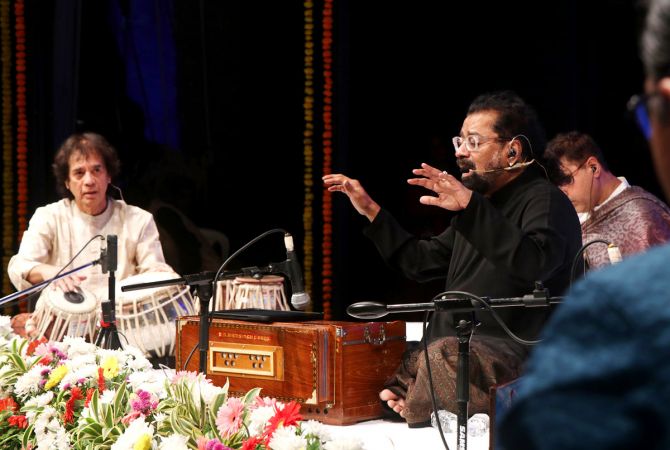
After our conversation, I gathered enough courage to sneak up to Zakir Hussain. I asked if I could have a chat with him after he had finished his lunch. I stressed on the last part a few times.
"We'll see," he growled.
I do not eat at press conferences. So I did not have lunch. Instead, I bade my time by stalking the legendary tabalchi, then still boyish at 52, from a safe and respectful distance.
He glanced in my direction often but largely ignored me, and sat in a corner of the hall having an unhurried conversation with his mother and brothers.
One of his young daughters leapt into his lap, and he coddled her for a while. Thinking it rude to stare, I kept looking away and back again without letting him out of my sight. I pretended to refer to my notes, and jotted down observations.
"Yes. What do you want to know?"
I looked up, startled. Ustad Zakir Hussain had appeared by my side. He drew a chair close and sat opposite to me.
He proceeded to delight me with a patient and relaxed interview. His stern mien had melted away and he joked often. Or maybe joshing with his daughters had put him in a better mood.
At the end of the interview, he asked me if I was satisfied with the answers. I nodded, delighted and starstruck.
"Come and watch us perform at Shanmukhananda," he said, extending an invitation.
"Ustadji, I would't miss it for anything in the world," I remember mumbling.
"Just tell them your name."
I wasn't sure if I heard him right. He shook my hand, patted my shoulder, and walked away.

On February 3, 2003, I reached Shanmukhananda auditorium just as the crows were waking.
I had not seen Mumbai that early in the morning except perhaps when I was taking an early flight out of the city, or returning home after a graveyard shift.
At the entrance, young men in white kurta-pyjamas were fixing saffron and yellow marigold streamers on the doors. I walked up to one of them and introduced myself.
"Haanji. Rediff India Abroad, hai na?"
I nodded.
He led me to a door behind the auditorium and entrusted me in the care of another young man in white, who escorted me to a steel folding chair placed against a wall with a view of the concert stage from the wings. He returned with a glass of tea.
So this was really happening. It was no reverie or accident. I allowed myself to breathe.
It was the third edition of 'Homage To Abbaji', a day-long musical celebration in memory of Ustad Alla Rakha Qureshi, Hussain's father, and the pre-eminent ambassador of tabla to the Western world.
On the bill were free public performances by a glittering cast of virtuosi, and the doors were open to all lovers of music.
I mean the front doors. The back doors were open to a chosen few. And I pinched myself at the realisation that I was one.
I glued myself to that steel chair for hours. A galaxy of Pandits, Vidwans, and Ustads walked past me, and I gleaned snatches of conversation as they laughed, talked, and greeted each other.
I gasped as I recognised Vikku Vinayakram, Pandit Kishen Maharaj, Pandit Hariprasad Chaurasia, Pandit Shiv Kumar Sharma, and so many others who drifted past me to the stage for their performances.
Huddled with me backstage were a couple of musicians who would be famous in years to come.
Of them, I remember Karsh Kale, then an emerging artist who had just made a name for himself (and an India Abroad cover story).
He seemed as gobsmacked as I was at being there. He cheered loudly after each performance and his eyes were streaming.

The final performance of the evening was the most awaited one. Before that, we were politely instructed to clear the backstage area and find space in the auditorium, which was packed to the rafters.
I found room on the floor, which had just about enough space for another molecule of humanity.
Ustad Zakir Hussain, John McLaughlin, Selvaganesh, and U Shrinivas (vocalist Shankar Mahadevan would join them a few years later) delivered an ethereal recital, and were joined briefly by Rahul Sharma on the santoor.
Late that evening, I returned to earth and played Shakti till dawn on my Sony Walkman. It is still the music I return to when I want to elevate myself from a dark place, and it always does.
For decades, I found no words to describe what that day meant to me, wasting them on party conversations laced with a tinge of braggadocio. Today, I must keep my end of the bargain.
The eulogies will pour for Ustad Zakir Hussain. There will be those who recount his genius, his enterprise, his achievements, his grace, and his charm. I have no selfies or autographs to remember him by, but I will never forget his most generous and gracious gift to me -- one day in heaven, among the celestial ensemble of Indian music.
Go well, Ustadji. The gods have gathered and they can't wait for your fingers to fly.
Bijoy Venugopal, a freelance writer, was a journalist with Rediff.com/India Abroad from 2001 to 2004. He reported about the Remember Shakti tour on Rediff.com
Feature Presentation: Rajesh Alva/Rediff.com
